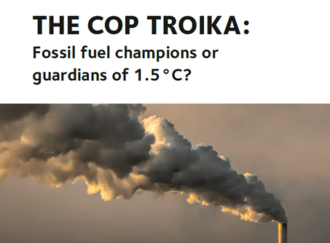
The COP Troika – fossil fuel champions or guardians of 1.5°C?
New research shows COP Troika nations – Brazil, UAE, and Azerbaijan – plan to expand oil and gas production 32% by 2035, endangering the 1.5°C climate limit their role as COP presidencies is meant to champion. Limiting warming to 1.5°C, a key objective the COP Troika has committed to defend, requires countries to immediately end fossil fuel expansion.
The COP Troika: Fossil fuel champions or guardians of 1.5°C?
New research shows COP Troika nations – Brazil, UAE, and Azerbaijan – plan to expand oil and gas production 32% by 2035, endangering the 1.5°C climate limit their role as COP presidencies is meant to champion.
At COP28, all countries pledged to transition away from fossil fuels in a just, equitable, and orderly manner. The COP Troika have also publicly committed to submitting 1.5°C-aligned Nationally Determined Contributions (NDCs) ahead of COP29 next month. However, these nations’ expansion plans contradict the urgent need to halt new fossil fuel developments. Science is clear: as a minimum benchmark for the implementation of this decision, countries’ Nationally Determined Contributions (NDCs) must include a commitment and a plan to immediately end the approval of new oil, gas, and coal projects.
Read the briefing Read the press release
Key findings:
- Together, the Troika nations account for nearly one-third of the carbon pollution committed by newly approved oil and gas fields in 2024. Despite the UAE’s leadership in seeing the landmark COP28 agreement to transition away from fossil fuels as its key COP legacy, the country ranks first for oil and gas expansion approvals since December 2023 globally; with one new field projected to operate until 2100 – far beyond the global deadline for phasing out fossil fuels by 2050. Brazil ranks third for 2024.
- The projected increase in oil and gas production by 2035, the date at which the NDCs due next year will end, is 36% for Brazil, 34% for the UAE, and 14% for Azerbaijan. Globally, fossil fuel production must decline by 55% by 2035 to limit warming to 1.5°C, according to the International Energy Agency.
- While the Troika’s expansion plans raise concerns, Global North oil and gas producing countries, led by the United States, are the worst culprits for oil and gas expansion to 2050. These countries must not only end expansion, but also phase out existing production fastest and provide their fair share of climate finance. Without immediate and fast actions from these countries, there will be no just and equitable phase-out of fossil fuels.
- The New Collective Quantified Goal on finance (NCQG) is essential for achieving a just energy transition. To ensure a fair phase-out of fossil fuels, and the expansion of renewable energy and energy efficiency, COP29 must agree to at least $1 trillion annually in grants and grant-equivalent finance from the Global North, including a mitigation subgoal of at least $300 billion per year to unlock the delivery of the COP28 energy transition goals in the Global South.
- The Troika countries were net exporters of up to 750 million tonnes of carbon pollution from oil and gas as of 2022. Their combined fossil fuel footprint doubles when counting the carbon pollution caused by their exported oil and gas production. This is why NDCs that only cover fossil fuel use within their borders would fail to account for their full climate footprint.
The three countries forming the COP Troika have assumed, through their presidency of COP28, COP29, and COP30, a key role in guiding international climate action. While also major fossil fuel producers themselves, the COP Troika have committed to submit NDCs aligned with the 1.5°C temperature limit, which also gives them a responsibility to end the expansion of fossil fuel production. Halting new fossil fuel projects would begin to align COP Troika nations with 1.5°C goals, while ignoring expansion in NDCs would betray climate commitments. The Troika countries have a clear choice to make.
